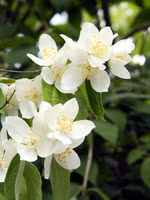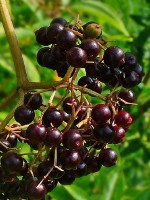Mon-Fri 9am - 5pm Mountain time
Mock Orange vs Ranch Elderberry
Philadelphus coronarius
Sambucus canadensis Ranch
NOT AVAILABLE THIS SEASON - MIGHT RETURN
NOT AVAILABLE THIS SEASON - MIGHT RETURN
Mock Orange is an ornamental shrub known for its fragrant, white flowers. The scent is often described as orange-like with a hint of jasmine. Attractive to pollinators, hummingbirds, and humans alike.
Mock Orange is highly versatile, and can be used as an ornamental shrub, either alone or as a hedge. It is well suited for streambank stabilization and riparian zone restoration, due to its ability to grow in low, moist areas as well as those that are high and dry. Lewis Mock Orange also has the capability of being used in soil bioengineering projects such as live staking.
Ranch Elderberry is a vigorous and high-yielding Black Elderberry cultivar. It ripens earlier than other varieties and is smaller and more compact making berry harvest easier. The berries are well-suited for baked goods, jams, jellies, and syrups. They are high in vitamin C and reported to be beneficial for the immune system.
Black Elderberries are considered to be partially self-pollinating. So while they will still produce some berries without cross-pollination, planting with another variety will increase yields. Consider planting with Black Elderberry or Bob Gordon Elderberry.
Warning: the seeds, stems, leaves, roots, and uncooked berries are toxic to humans when eaten in quantity. Berries should be cooked to make them safe for human consumption.
Mock Orange Quick Facts
Ranch Elderberry Quick Facts
Toxicity: leaves, stems, and uncooked berries are poisonous to humans

